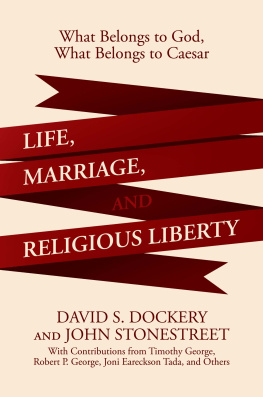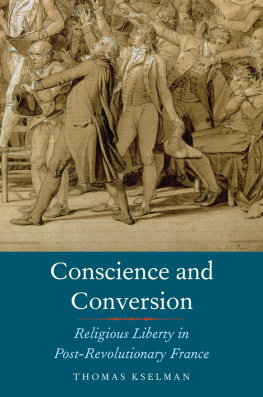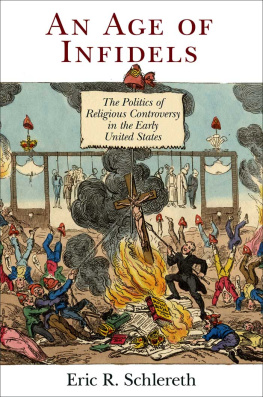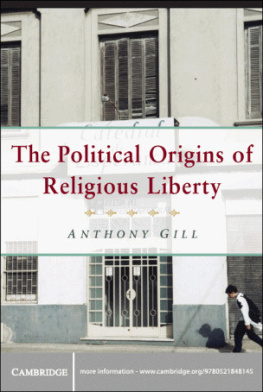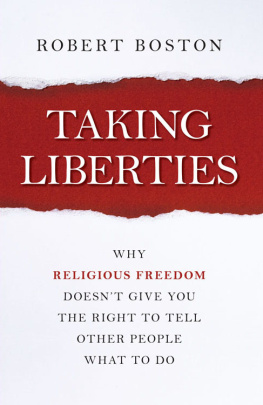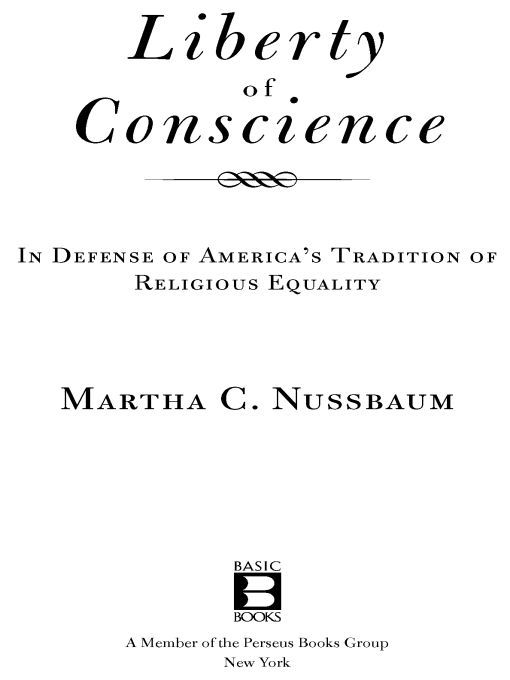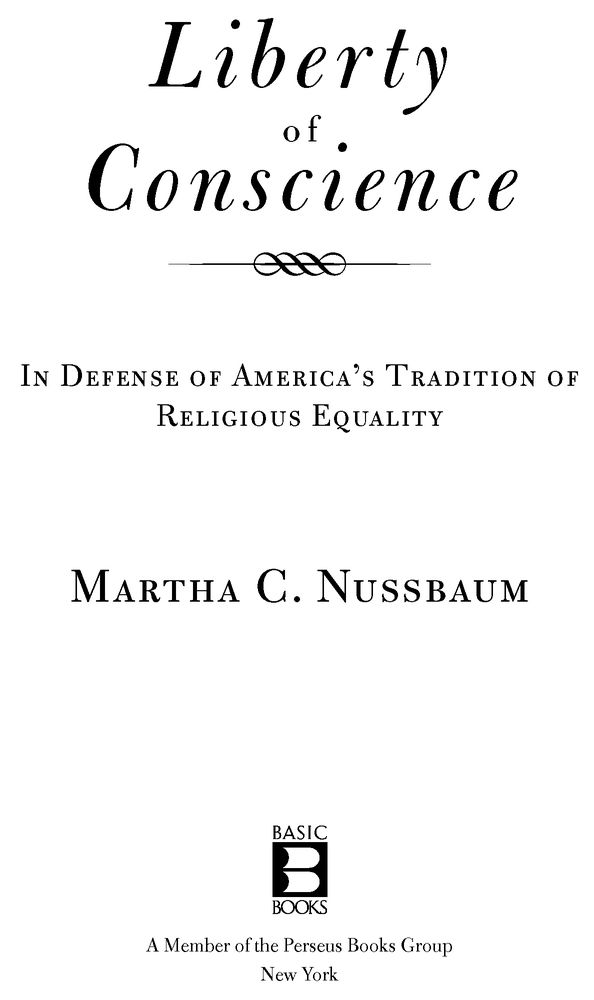Table of Contents
In memory of Philip Quinn, 1940-2004
INTRODUCTION
A Tradition Under Threat
Every year, at Thanksgiving, thousands of small American children dressup like Pilgrims. Grave in tall hats and buckled shoes, or starched bonnets and aprons, they proudly act out the story of that courageous band of settlers who fled religious persecution in Europe, braving a perilous ocean voyage and the harsh conditions of a Massachusetts winterall in order to be able to worship God freely in their own way. Those who survived feasted with the native inhabitants and gave thanks to God.
We cherish and celebrate this story, but we too rarely reflect on its real meaning: that religious liberty is very important to people, and that it is often very unequally distributed. The dominant majority in England did not have to run risks to worship God according to their consciences. They established an orthodoxy, an official church, that favored them and subordinated others. In the England from which the Pilgrims fled, people were not equal citizens, because their rights were not equally respected by the government under which they lived. The Pilgrims were not expelled from England, as the Jews had earlier been expelled, but they were living in a condition of subordination. Something very precious had been withheld from them, and it was to recover that space of both liberty and equality that they crossed the ocean in three small vessels.
The lesson of the first Thanksgiving is easy to forget. Indeed, the early settlers themselves soon forgot it, establishing their own repressive orthodoxy, from which others fled in turn. People like exclusive clubs that rank them above others. My mothers ancestors came over on the Mayflower, and some of my relatives were obsessed with triumphal genealogizing, as they marshaled the evidence that they belonged in the exclusive and socially prominent Mayflower Society, while others did not. The Pilgrims quest for freedom, centuries later, had become elite Americans quest for superiority. Nor was religious toleration in a healthy state among the Pilgrims descendants, as the exclusion of Jews (and, often, Roman Catholics) from local private schools, country clubs, law firms, and prestigious social events indicated. When I later married a Jew and converted to Judaism, the Pilgrims descendants did not applaud my choice to worship God according to my own conscience.
People love in-groups that give their members special rights. Equality, and respect for equality, are difficult for human beings to sustain. Particularly in the area of religion, which seems so vital to the salvation of individuals and the health of the nation, it is very tempting to think that orthodoxy is a good thing and that those who do not accept it are dangerous subversives. This sort of in-group favoritism, however, is what the laws and traditions of our country utterly reject. This is a country that respects peoples committed search for a way of life according to their consciences. This is also a country that has long understood that liberty of conscience is worth nothing if it is not equal liberty. Liberty of conscience is not equal, however, if government announces a religious orthodoxy, saying that this, and not that, is the religious view that defines us as a nation. Even if such an orthodoxy is not coercively imposed, it is a statement that creates an in-group and an out-group. It says that we do not all enter the public square on the same basis: one religion is the American religion and others are not. It means, in effect, that minorities have religious liberty at the sufferance of the majority and must acknowledge that their views are subordinate, in the public sphere, to majority views.
I. A Tradition of Fairness
The dominant American political tradition repudiates this style of thinking, so common in the worlds history. Citizens, we believe, are in fact all equal. We have not just rights, but equal rights. The state may not create a two-tiered system of citizenship by establishing a religious orthodoxy that gives rights to the nonorthodox on unequal terms. As Justice Jackson put it in a famous opinion holding that Jehovahs Witnesses may not be compelled to recite the Pledge of Allegiance in school (which their religion forbids, as a form of idolatry): If there is any fixed star in our constitutional constellation, it is that no official, high or petty, can prescribe what shall be orthodox in politics, nationalism, religion, or other matters of opinion or force citizens to confess by word or act their faith therein. If there are any circumstances which permit an exception, they do not now occur to us.
Our commitment to religious equality did not emerge immediately or easily. The colonial period saw intense and painful differences about religious matters, and much intolerance. Gradually, however, the sheer experience of living together with people who differed in belief and practice gave rise to a consensus: the future constitutional order must be dedicated to fair treatment for peoples deeply held religious beliefs. The framers of our Constitution reflected long and well about these matters, and they carefully wrote protections for religious fairness into the document they framed. The Constitution as a whole makes no reference to God, not even the vague and general reference to a Creator that Jefferson thought acceptable in the Declaration of Independence. Article VI states that no religious Test shall ever be required as Qualification to any office or public Trust under the United States. And the First Amendment states: Congress shall make no law respecting an establishment of religion, or prohibiting the free exercise thereof. The freedom of religion and a prohibition against setting up any religion as the national orthodoxy are the first two protections for citizens rights mentioned in that all-important amendment.
Throughout Americas history, those clauses have been understood to guarantee all citizens both religious liberty and religious equality: no religion will become an orthodoxy that undercuts any citizens claim to equal rights. Many difficult questions of interpretation have arisen, but on the whole Justice Jackson is right: a shared understanding of religious fairness has been a fixed star of our tradition.
To say that there is a shared understanding and that a noble tradition has on the whole prevailed is not to say that it has not often been assailed. Religious fairness has periodically endured challenges throughout our history, some subtle and some less subtle, some apparently benign and some violent. People arent always content to live with others on terms of mutual respect. So the story of the tradition is also a story of the attacks upon it, as different groups jockey for superiority. What has kept the tradition alive and healthy is continual vigilance against these attacks, which in each new era take a different concrete form.
This book concerns both the tradition and these periodic attacks, and its purpose is both to clarify and to warn. Without vigilance, our fixed star may not be fixed for much longer. Religious fairness has always encountered temporary threats. No doubt it will encounter others in the futurebecause the tendency to exalt ones own group as the good, orthodox group and to demote others is lamentably common in human life. Fear of strangers, demonization of new or unpopular groups, panics about the future of the nationall these, from time to time, have caused Americans to diverge temporarily from our fundamental constitutional commitment to equal citizenship and equal liberty in religious matters. It was one of those panics that led several states to mandate the recital of the pledge, expelling children who refused to recite it for religious reasons. For a time, even the U.S. Supreme Court went along. Jews, Mormons, Jehovahs Witnesses, Seventh-Day Adventists, atheists, members of nontheistic religions such as Buddhism or Taoism, Native Americans, Santeria worshipersall these have suffered religious disabilities at the hands of the majority. Constant watchfulness has been required to protect liberty and equality from various social pressures. Many of these threats, however, were local rather than nationwide, and many were short-lived. On the whole, despite such lapses, our judiciary has been a reliable guardian.


